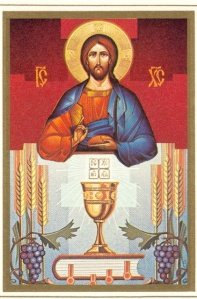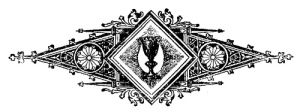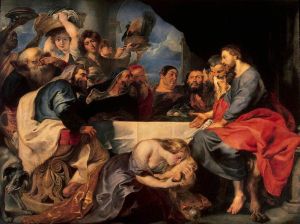
Today is the Solemnity of the Most Holy Body and Blood of Christ, often known as “Corpus Christi”. You might be thinking, gee, don’t we celebrate the Body and Blood of Christ at every Mass? Sure, but just as with the Lord’s Resurrection, a particular day is set aside to celebrate and reflect on this aspect of the mystery and saving work of Christ!
The Catechism, no. 1374, quotes both St. Thomas Aquinas and Pope Paul VI in teaching us about the presence of Christ in the Eucharist:
“The mode of Christ’s presence under the Eucharistic species is unique. It raises the Eucharist above all the sacraments as ‘the perfection of the spiritual life and the end to which all the sacraments tend.’ In the most blessed sacrament of the Eucharist ‘the body and blood, together with the soul and divinity, of our Lord Jesus Christ and, therefore, the whole Christ is truly, really, and substantially contained.’”
So, to repeat it, BOTH the Body and the Blood of Christ that we receive contain ALL of the body, blood, soul and divinity of Christ. Christ is not just there “beside the bread” (which is a Lutheran belief, consubstantiation – not to be confused with the word consubstantial in our Creed, which is not applied to the Eucharist). The word that we use for this is TRANSUBSTANTIATION. The substance of the bread or wine has changed – it is no longer bread or wine! It only retains the “appearances” (physical qualities) of bread and wine, but it is not bread and wine.
This is a great time to focus on how we approach for the reception of Holy Communion. Do we show respect for the Eucharistic species? How do our actions reflect our beliefs?
A couple of reminders on the reception of Holy Communion:
1) Bow, before both the Body and Blood of Christ. This still applies even if you are not receiving! (So don’t just walk past the Blood of Christ like it’s not there. Is that how you would pass Jesus in the street??)
2) If you are receiving in the hand, consume the consecrated Host immediately. Do not walk anywhere with the sacred species. If you drop Him, pick Him up and consume!
3) The reception of Holy Communion kneeling and on the tongue is always permitted!
Finally, another reminder – go to confession! To receive the Most Holy Eucharist, one should be in a state of grace. If it is not possible to get to confession, make a perfect act of contrition before reception, and then go to confession! How amazing and awesome the endless mercy of God…


